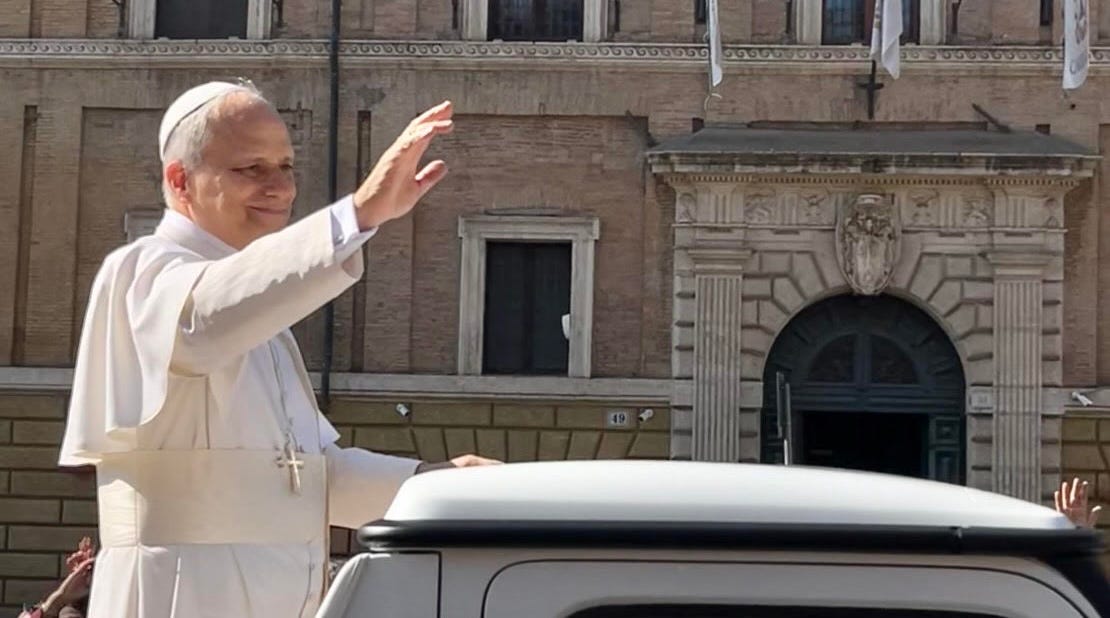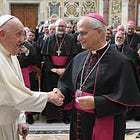Leo XIV cites Amoris Laetitia for the first time
Papa Prevost's reference to Amoris Laetitia marks a new stage in his commitment to Francis' legacy.

Papa Prevost's reference to Amoris Laetitia marks a new stage in his commitment to Francis’ legacy.
(WM REPORTS) – Leo XIV has cited Francis’ controversial 2016 document Amoris Laetitia in a message sent to participants at a Vatican seminar on evangelizing families.
This appears to be his first public reference to the document since his election in May.
Dated 28 May and published on 2 June, the message was addressed to the Dicastery for the Laity, Family and Life, ahead of its seminar titled “Evangelizing with Families Today and Tomorrow.” The letter echoes familiar themes from the Francis era, blending pastoral language with the now-routine call for “openness” to new ways of thinking.
In a direct quotation from Amoris Laetitia §76, Leo wrote that the “Gospel of the family also nourishes seeds that are still waiting to grow,” praising its “basis for caring for those plants that are wilting and must not be neglected.”
The citation marks Leo XIV’s first public reference to Amoris Laetitia, a document notorious for undermining the Church’s moral teaching, and sparking years of confusion and protest—including the 2016 dubia submitted by four cardinals.
The same document also cites a 2015 General Address from his late predecessor. However, this address is far from the first indication of his attitude towards Francis’ reign. Since his election, Prevost has publicly stated that he has “felt” Francis to be “in heaven” on three occasions.1
He has also cited Francis’s Apostolic Exhortation Evangelii Gaudium at least four times. This 2013 document, endorsed by Hans Küng, includes the heretical statement that the “greatest commandment” is love of one’s neighbour, rather than love of God, which denies the words of Christ in the Gospel.2
It also claims that the Mosaic Covenant “has never been revoked,” and strongly implies that Jews do not need to convert to the Catholic religion (n. 247).
Prevost has also cited Laudato si’ three times across two addresses, including a video message celebrating its tenth anniversary and endorsing the UN’s COP30 climate agenda.
He has also cited Francis’ 2019 Abu Dhabi “Document on Human Fraternity,” jointly issued with the Grand Imam Ahmad Al-Tayyib. This document claims that God wills “the plurality and diversity of religions, an idea which is recognised as a declaration of apostasy.
The document also reiterates the condemned error of religious liberty. It was incorporated into the Acta Apostolicae Sedis in March 2019.
Some may argue that Leo’s message does not amount to a full endorsement of the controversial passages in Amoris Laetitia and the other texts.
But the principle remains: he has cited them positively and without qualification. It is not the responsibility of his readers and listeners to “put the best spin” on such references, or to assume that he does not mean what he says, or is withholding his assent from the heretical or heterodox aspects of the cited texts.
On the contrary, Leo XIV must be taken at his word. It is his responsibility to make clear that he is rejecting false teaching, rather than reaffirming documents that contain it. Until and unless he publicly repudiates these documents, he must be understood as endorsing them.
For analysis of Leo’s stated “complete commitment” to the path followed since Vatican II—and its grave implications—see our in-depth study: What Leo XIV’s ‘complete commitment’ to Vatican II REALLY means:
HELP KEEP THE WM REVIEW ONLINE WITH WM+!
As we expand The WM Review we would like to keep providing free articles for everyone.
Our work takes a lot of time and effort to produce. If you have benefitted from it please do consider supporting us financially.
A subscription gets you access to our exclusive WM+ material, and helps ensure that we can keep writing and sharing free material for all.
(We make our WM+ material freely available to clergy, priests and seminarians upon request. Please subscribe and reply to the email if this applies to you.)
Subscribe to WM+ now to make sure you always receive our material. Thank you!
Read Next:
Follow on Twitter, YouTube and Telegram:
“Beginning with Saint Peter and up to myself, his unworthy Successor, the Pope has been a humble servant of God and of his brothers and sisters, and nothing more than this. It has been clearly seen in the example of so many of my Predecessors, and most recently by Pope Francis himself, with his example of complete dedication to service and to sober simplicity of life, his abandonment to God throughout his ministry and his serene trust at the moment of his return to the Father’s house.”
Address to Cardinals, 10 May 2025
“During Mass, I strongly felt the spiritual presence of Pope Francis accompanying us from heaven. Reflecting on our participation in the communion of saints, I recall that yesterday in Chambéry, France, the priest Camille Costa de Beauregard, was beatified. He lived from the end of the 1800s to the beginning of the 1900s, and was a witness of great pastoral charity.”
Regina Caeli, 18 May 2025
“Today, in a special way, we remember our beloved #PopeFrancis with deep gratitude, who exactly one month ago returned to the Father’s house. He accompanies us and prays for the Church from Heaven.”
Tweet, 22 May 2025.
“Master, which is the greatest commandment in the law? Jesus said to him: Thou shalt love the Lord thy God with thy whole heart, and with thy whole soul, and with thy whole mind. This is the greatest and the first commandment. And the second is like to this: Thou shalt love thy neighbour as thyself. On these two commandments dependeth the whole law and the prophets”. (Matthew 22.36-40)
For more on the traditional interpretation of this point, see Novus Ordo Watch’s resources here.


As sure as night follows day.